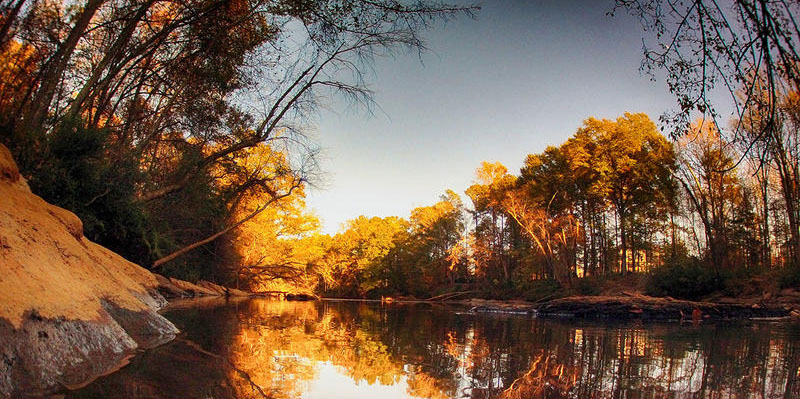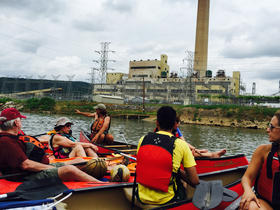Chattahoochee, Coosa River’s Water Quality At Risk In Ga.

STEVE HARWOOD / FLICKR.COM/CAPTKODAK
CREDIT COURTESY OF THE GEORGIA WATER COALITION
In the Atlanta region, the Chattahoochee and the Coosa Rivers are the problem children when it comes to water quality, according to the latest “Dirty Dozen” report from the Georgia Water Coalition.
The list highlights what it considers the 12 biggest water quality problems in the state.
The Chattahoochee River runs 436 miles from the north Georgia mountains, down through Atlanta and into southwest Georgia.
The state’s environmental agencies, Georgia’s Environmental Protection Division (EPD) and the board of the Department of Natural Resources, voted in August to eliminate a 40-year state requirement at that river.
‘Water Grab’ At The Chattahoochee
The state used to require a minimum water flow of 750 cubic feet per second where the Chattahoochee River and Peachtree Creek in Atlanta intersect.
The Georgia Water Coalition said it’s essentially a water grab in the latest of the state’s water wars with Alabama and Florida.
“Through this decision, metro Atlanta won, everybody downstream lost,” said Chattahoochee Riverkeeper Jason Ulseth.
He said the state can now hold back more water as a reserve in the event of a drought, but there’s no way to tell yet how that will affect the Chattahoochee’s water quality long term.
Lower Water Quality?
Georgia River Network’s Chris Manganiello said there was a reason for the minimum.
“Since the 1970s, that minimum helped protect the health of the river downstream from Atlanta, where more than a dozen sewage treatment plants discharge into the river,” Manganiello said.
Chattahoochee Riverkeeper Jason Ulseth said before eliminating the water flow minimum, the state should have completed studies on how the change would impact fish, visitors who use Lake Lanier for recreation and whether the sewer discharges will still be diluted enough by the time it gets to downstream residents.
“Downstream of Buford Dam, we have the Chattahoochee River National Recreation Area that receives over 3 million annual visitors, and they have to have enough water to support recreation such as fishing and boating,” Ulseth said. “By reducing flows, we’re putting the river at risk for lower water quality that can harm fish, but we’re also putting this vital national park at risk by not sending enough water through the area.”
The river provides drinking water for nearly 4 million people, or 75 percent of Atlanta area residents.
Coosa River

CREDIT COURTESY OF THE SIERRA CLUB GA / HTTP://BIT.LY/1MEQJTP
As for the Coosa River, in northwest Georgia, the Georgia Water Coalition said a Georgia Power coal-fired power plant, is killing up to 60,000 adult fish each year near Rome.
“We have one of the few places in the country where land-locked striped bass still spawn,” said Joe Cook, the advocacy and communication coordinator with the Coosa River Basin Initiative. “And during the spring spawning season, as many as 24 million striped bass eggs that can get stuck into Plant Hammond’s pipes in a single day. That’s a lot of potential fish to lose.”
In 2004, the Environmental Protection Division said cooling towers were needed at Plant Hammond to reduce the hot water discharge into the river.
“The funding is tied to the political will. If you had an administration that made environmental protection of our rivers and streams a priority, perhaps we would get more funding for EPD and these continuing problems would get corrected in a more timely manner,” Cook said.
A Clean 13
The list includes a bonus: something the Georgia Water Coalition thinks the state did right.
“As much as we like to complain, the state is to be commended for denying Kinder-Morgan the right of eminent domain to build the Palmetto Pipeline, which would have run from Augusta all the way down the Savannah River, along the Georgia Coast to Florida,” Cook said. “Gov. Deal took a stand on that and DOT followed through and that’s a good thing for Georgians.”
The Georgia Water Coalition said the 360-mile Palmetto Pipeline might have impacted drinking water for 1.8 million people and sensitive wetlands along the Georgia Coast.
9(MDAxODM0MDY4MDEyMTY4NDA3MzI3YjkzMw004))






